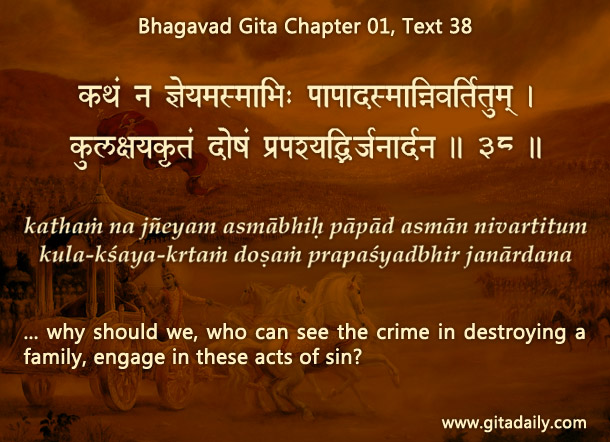Suppose the CEO of a company loses their job because their company goes bankrupt due to a recession. The CEO will naturally worry, but what do they worry about the most? Their reputation? Their family’s social standing? Their employees’ livelihood? The bigger their primary concern, the greater their thoughtfulness.
On the Kurukshetra battlefield, Arjuna faced a gargantuan problem: should he participate in an immense fratricidal war? While facing this problem, he voices his concerns in the Bhagavad-gita’s first chapter. Not once does he express any fear of his own death. His concerns range from sin and its consequences (01.32-35); the destruction of the dynasty and the consequent devastation of society (01.39-45); and the ethical feasibility of fighting for a kingdom at such immense human cost (01.37-38).
That he is able to think of such concerns on a battlefield is remarkable. That he is able to articulate those concerns coherently is even more remarkable. That he is articulate while being so emotionally afflicted and ethically conflicted as to be unable to even hold on to his bow (01.29) is most remarkable.
Pertinently, commentators such as Madhusudana Saraswati assert that the Gita’s first chapter highlights Arjuna’s qualification for spiritual wisdom. His virtue of thoughtfulness made him capable of comprehending the Gita’s profound wisdom.
But wasn’t Arjuna’s reasoning in the first chapter wrong? Not exactly wrong; it was ill-informed and inadequately far-sighted, because it overlooked our essential spiritual identity and destiny. Nonetheless, it’s noteworthy that he retained his basic reasoning ability with him even amid great emotional and ethical duress.
Once his thoughtfulness was grounded in and guided by the Gita’s wisdom, he became empowered to do his difficult duty with determination and devotion (18.73).
One-sentence summary:
The more thoughtful we are, considering factors beyond our immediate or self-centered concerns, the better we can appreciate Gita wisdom.
Think it over:
- What do our concerns amid problems reveal about us?
- What does the Gita’s first chapter reveal about Arjuna’s character?
- Which virtue of Arjuna is revealed in the Gita’s first chapter and built upon in its later chapters? Explain.
***
01.38: Why should we, who can see the crime in destroying a family, engage in these acts of sin?
To know more about this verse, please click on the image


Leave A Comment